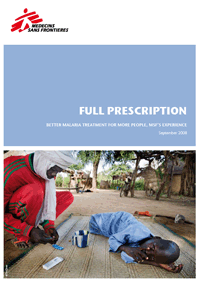Getting life-saving malaria care to many more patients
Johannesburg/Brussels, September 30, 2008 —In a new report launched today, the international medical organization Doctors Without Borders/Médecins Sans Frontières (MSF) said many more lives can be saved if newer effective strategies to tackle malaria are more widely implemented. The report, titled "Full Prescription; better malaria treatment for more people, MSF’s experience,"describes the organization’s work in Sierra Leone, Chad and Mali, and shows that unnecessary deaths can be avoided with simple, affordable treatment and diagnostic tools available today.
Johannesburg/Brussels, September 30, 2008 — In a new report launched today, the international medical organization Doctors Without Borders/Médecins Sans Frontières (MSF) said many more lives can be saved if newer effective strategies to tackle malaria are more widely implemented. The report, titled "Full Prescription; better malaria treatment for more people, MSF’s experience,"describes the organization’s work in Sierra Leone, Chad and Mali, and shows that unnecessary deaths can be avoided with simple, affordable treatment and diagnostic tools available today.
"Although still insufficient, increased funding is available for malaria," said Meinie Nicolai, General Director of MSF in Brussels. "Newer and more effective drugs have started to arrive on the shelves, rapid tests exist that can confirm the diagnosis in fifteen minutes. But many efforts are failing at the last hurdle and scores of sick people, mainly children, still do not get the treatment they need."
In large parts of sub-Saharan Africa, people do not go to health structures because they are too expensive and too far away. In Sierra Leone, for example, only 12 percent of children suspected of having malaria received efficient treatment in the health services. MSF’s experience and research show that the fees patients are requested to pay are a huge deterrent to seeking care in most of the poor settings where MSF works.
A second barrier to providing malaria care effectively is geographical. Some rural communities are very remote from health structures, or isolated by water during the rainy season. Strategies involving malaria village workers have proved to be highly efficient in reaching and treating malaria patients where they live. By combining free care at health center level and in the communities that were geographically isolated, MSF’s project in Mali succeeded in tripling the number of malaria cases detected and treated over a year’s time.
This has been possible without jeopardizing the quality of care through user-friendly rapid tests, which allow lay-people with basic training to confirm if the patient’s fever is indeed caused by malaria. When cases are identified, the malaria village worker dispenses drugs to the patient or the caretaker free of charge.
"Malaria village workers are not the silver bullet," explained Christine Jamet, Head of Mission for MSF in Chad. "But they allow to efficiently bridge the gap where health structures are not accessible. They should not exempt the authorities from extending access to care, especially as people who test negative for malaria must be treated for whatever causes their fever and complex cases need to be referred to a health structure. To ensure appropriate medical treatment, malaria cases should be systematically confirmed by using a test."
At the moment, the World Health Organisation (WHO) recommends to treat all children with fever, in highly endemic regions, with anti-malarial drugs. But in a Sierra Leone for example, a high-transmission area, systematic use of rapid tests in our project in Bo showed that 30 to 40 percent of the suspected cases under five are actually negative. Not using the tests - as recommended by WHO - means that many will receive treatment for the wrong disease and no further examination will be performed to check what actually causes the fever.
Until more successful prevention and eradication measures bear their fruit, patients will continue to die needlessly if available efficient treatment and diagnostic tools do not reach them. Shipping tests and drugs to the country is not enough; measures to actually ensure their delivery to patients need to be implemented urgently.


![[PDF] [PDF]](/sites/default/files/pdf_12.gif)



